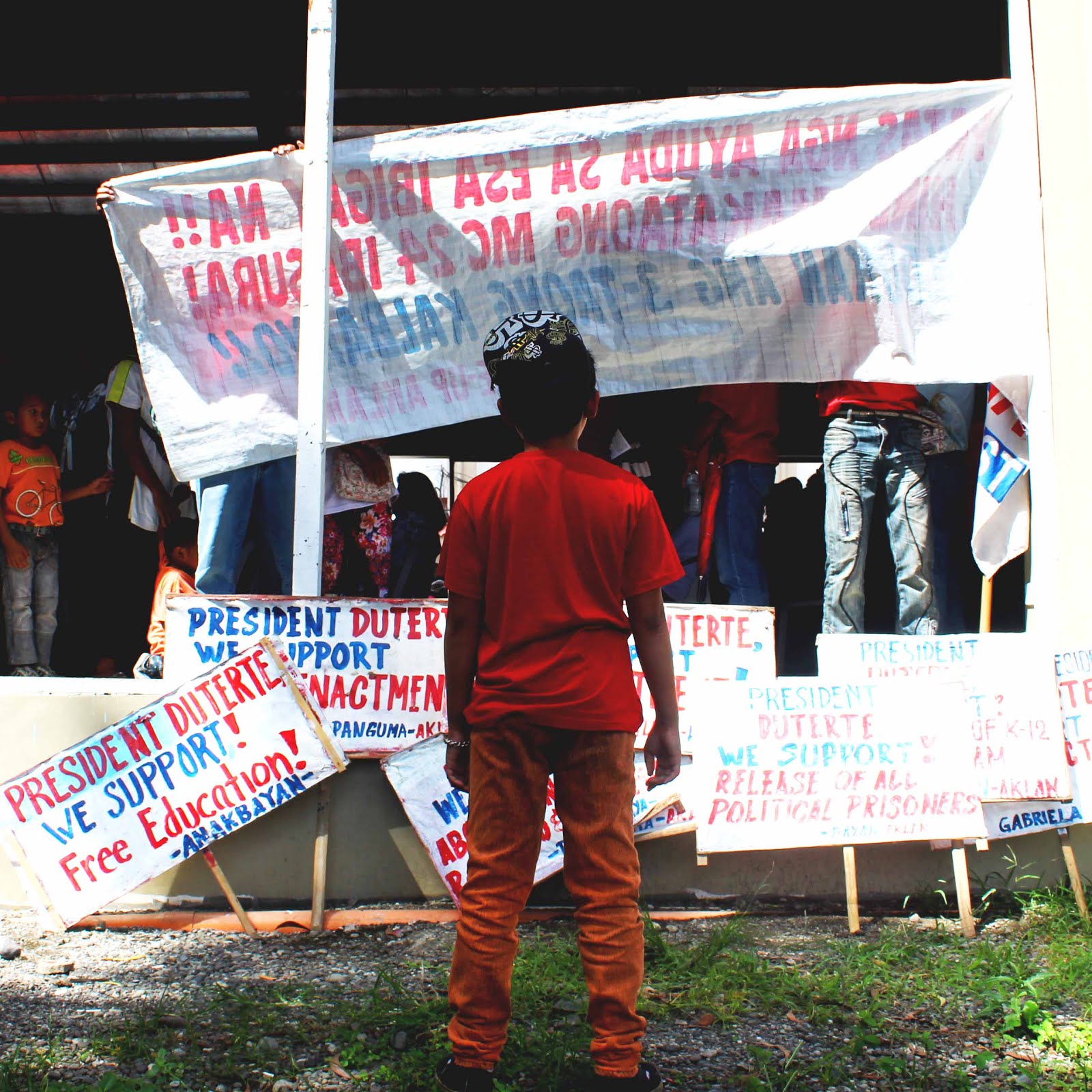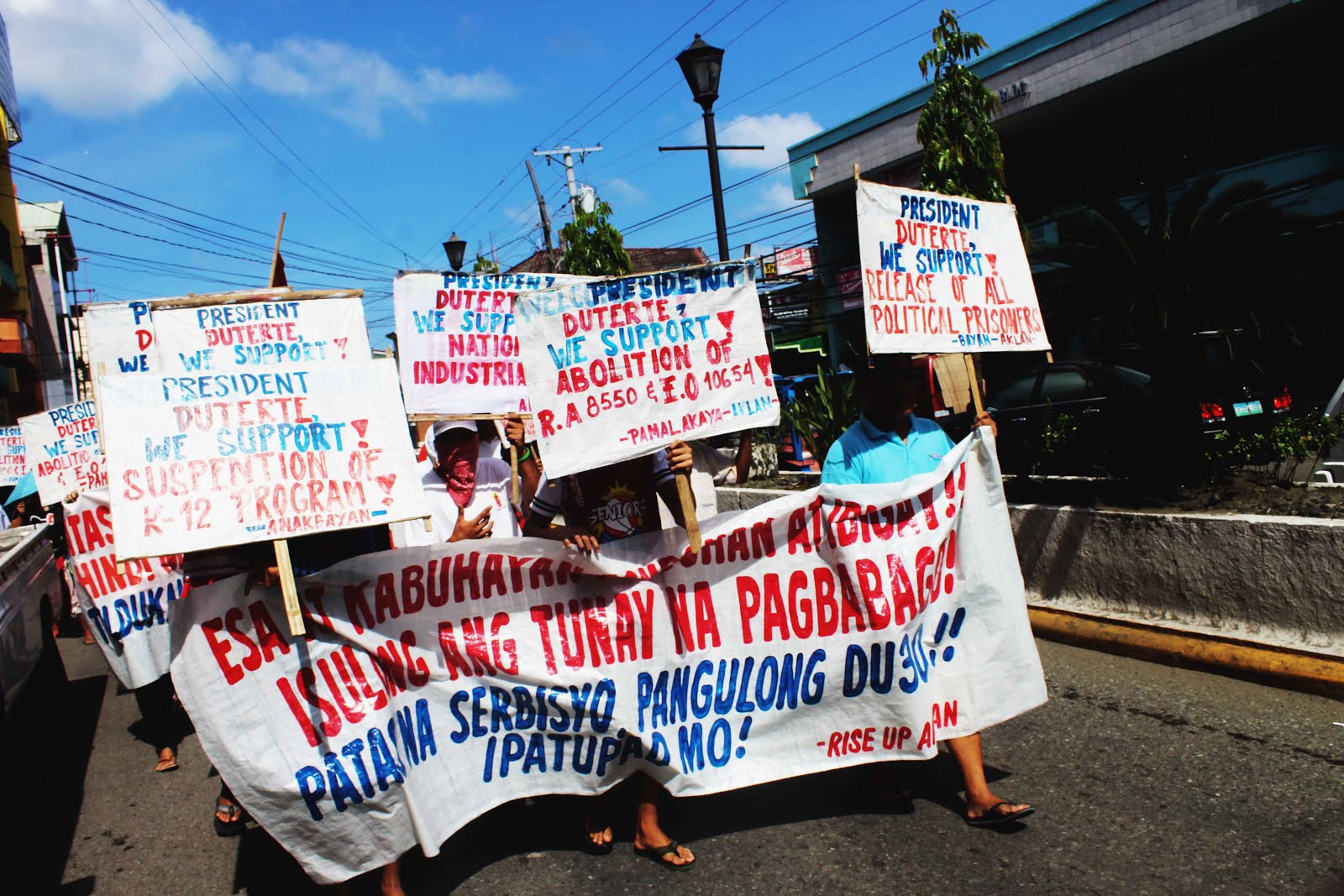Miracle on Rizal Pala-Pala II
12:49 AMEVIDENCE of last year’s election still litter the narrow eskinitas of Barangay Rizal Pala-Pala II – faded stickers on lampposts, tarpaulins now used as makeshift roofs and campaign t-shirts hung out to dry with the other laundry.
It takes very little thought
to deduce which former candidate’s slogans and paraphernalia are the most
prevalent in the area.
“Change is coming.”
Printed on streamers,
heralded on the radio, and headlined endlessly by tabloids and the mainstream
media, the slogan has become an inescapable rallying cry of President Rodrigo
Duterte and his supporters.
In his first year in office,
the former Davao City mayor has steered the Philippines into a divisive time —
slammed by critics as he is venerated by his legions of followers — mandating
widespread reforms that have rattled the entire nation.
The cornerstone of Duterte’s
brand of “change” is a double-barreled war on drugs, fueled by his own
experience as a hard-lined local official in the south, clamping down strong on
the illegal trade.
“There will be no letup to
this campaign. We will not stop until the last drug lord, last financier and
last pusher have surrendered or put behind bars or below the ground if they so
wish,” Duterte declared in his first State of the Nation Address in July 2016,
to the resounding cheer of a full-house Batasang Pambansa.
Fifty-year-old mother of
five Nanay Melba* has seen for herself the sweeping change endorsed by Duterte
in the congested neighborhood of Barangay Rizal Pala-Pala II, Iloilo City.
While admitting that the
anti-drug crusade has sprung significant good in some aspects, she continues to
be wary of the “change” our current president is trying to peddle.
“Gapasalamat gid ko nga
subong nag-untat na ang druga, galing ang masakit subong biskan wala ka sala,
nagbag-o kana, gina-amo ka pa na,” she says, concerned and worried.
The issue hits close for
Nanay Melba. More than a decade ago, she and her husband turned to selling
shabu from their small home to provide for their family, especially their
youngest son, Paulo*, who was just a little over 2 years old at the time.
“Sa kapigadohon gin kilanlan
gid,” Nanay Melba says of their decision to sell prohibited drugs. There was a
time they could not afford to buy milk for their children. Their newborn was
subsisting on sugar mixed in water. Wanting to provide for them better, the
couple took to trading shabu.
She has long given up
selling illegal drugs. But the rising number of drug-related casualties – more
than 7,000 as of Jan. 31, according to Philippine National Police (PNP) data –
worries her. On the eve of the “suspension” of the war on drugs, PNP chief
Ronald “Bato” Dela Rosa himself admitted the crusade was abused by rogue
officers and opportunistic syndicates.
Nanay Melba reveals that
during the election period she seriously considered voting for the tough-talking
politician. She was “bilib gid (very impressed)” and hopeful of Duterte’s plans
for the country, but she was eventually convinced to choose another candidate.
“Akon tani botohon si
Duterte, kay syempre hambal ya mareporma sia sa druga, pero wala ko ga-expect
nga muni kadamo ang mapatay.”
Her grandson seated on her
lap, Nanay Melba asserts that she got into the drug trade purely for her
children. She maintains that she has never, not even once, tried snorting
drugs, but also admits her husband was once a user. When she was into the drug
trade, she says, she vowed not to sell to minors, including students.
“Ang mga estudyante wala ko
ginabaligyaan. Ginasiling ko sa ila, ‘Maluoy ka sa imo ginikanan,’ kag
ginapapuli,” she explains. “Ako nagbaligya lang gid ko para lang sa akon
kabataan, nagbaligya ko pero wala gid ko nagtilaw.”
For a time, selling drugs
provided well for her family, until Paulo was diagnosed with leukemia at the
age of four in 2004. The shattering news forced Nanay Melba to take a hard look
at the life she led. Not long after, her husband was arrested and sentenced to
jail for drug possession, a case that would be dismissed six years later.
Nanay Melba was left to
singlehandedly provide for her children, including Paulo, who was quickly becoming
ill. She knew she had to change.
“Nakapaminsar ko nga ang
bata ko basi nagkabalatian kay ang gina-obra ko ilegal kag malain. Nagpangadi
ko nga ‘Lord, hatagi ko last chance, untatan ko ni, para nga mabuhi bata ko,’”
she says. “‘Kon mabuhi bata ko, pangako ko simo, mauntat ko. Kon mabalik ko
baligya, kuhaa buhi sing bata ko, indi ko pagbasol sa imo.’”
In 2004 Nanay Melba stopped
selling drugs to make good on her promise, taking on numerous odd jobs as the
lone breadwinner of her family, “Nagbaligya ko isda, naglabada, halos tanan
ginsudlan ko para mabuhi ko akon pamilya.”
She made it a habit to go to
church with Paulo every Sunday at the San Vicente Ferrer Parish Church in
Leganes to petition for her son’s health and well-being. For the first few
months, Paulo had to undergo chemotherapy at least twice a week.
During a procession when
Paulo was five years old, Nanay Melba shares he tugged at her blouse pointing
to the image of a sheep adorning one of the karo.
“Pagwa namon sa ospital,
nag-upod kami sa isa ka prosesyon. Kakita sya tupa, hambal ya sakun, ‘Mama,
muna bala akun damgo. May mga muna, dasun nagsaka ako sa mataas nga hagdanan.
Pero may naghambal sakun nga tigulang nga ‘Naog toh, hindi ka pa di. Puli toh,
hindi ka pa di pwede,’” retells Nanay Melba, who shares she burst into tears
after hearing Paulo narrate the dream.
The financial strain of the
continuous medical procedures proved too much for a mother raising kids on her
own. Thankfully, in 2006, Paulo and Nanay Melba were taken in by the Kaibigan ng
mga Kabataang may Kanser as a recipient of their program.
“Sa tuod lang wala ko kabalo
kung paano ko nasarangan magbaka-baka nga isa lang ko sa una nga duwa ka tuig
nga nagkabalatian bata ko kag nag-untat ko baligya druga,” Nanay Melba shares,
expressing thanks to the foundation that has stepped in to help her and her
son, as well as the people in their small community that have aided and
supported her.
In 2010, her husband’s case
was thrown out and he was released from prison. At first she was delighted that
their family was reunited, but grew fearfully when she got wind that he was
back to selling and using illegal drugs.
“Ging kompronta ko gid siya.
‘Hindi bala nangako ta nga hindi na ta magbaligya, nahutikan ako nga may
gapangita naman sa imo, diskompiyado ko, basi gabaligya ka naman’” fumes Nanay
Melba. “Kung mabaligya ka, halin ka na di sa balay, layas ka lang di. Kay ngaa
nangako ta nga kung mabaligya ta mapatay bata ta, kung mabaligya ka daw ikaw
mismo nagpatay sa bata ta. Mas mayo pa nga mahalin ka nalang di sa balay, hindi
pagpatya bata ta.”
From then on, her husband
swore to stop using and selling shabu for the sake of their children. They both
took jobs as street sweepers earning an honest wage of P400 a day to provide
for their family.
However, in November 2016 –
five months after Duterte assumed power – they were dragged back into the trade
they had shunned years before, appearing in the drug watch list of the local
PNP.
Under the premise of Oplan
Tokhang, their house in Rizal Pala-Pala II was raided unannounced by armed
policemen.
Neither Nanay Melba nor her
husband was present during the operation because they were at their jobs. The
only people home were three of their children and their grandson.
“Ano gane gingsugo sa inyo
sing pulis?” Nanay Melba asks her two-year-old grandson sitting on her lap.
“Hapa! Hapa!” he meekly
chimes back, his fingers folded to imitate a gun.
A few days after, while
buying cigarettes at a sari-sari store, Nanay Melba’s husband would be cornered
by policemen, and arrested allegedly with drugs in his possession. She
maintains that the shabu was planted as the two promised to each other never to
engage in the illegal trade again.
She herself would be
subjected to a mandatory drug test as a city employee. Nanay Melba proudly
displays the negative lab results of her drug exam at home as a badge of honor.
However, her husband hasn’t been as lucky, as he’s been sentenced to 12 years
in prison.
The sad irony is that Nanay
Melba would rather have her husband safe while locked up in jail than dead at
the hand police as another casualty of the drug war.
“Okay lang, importante buhi
siya. Kita ko subong grabe ang patyanay, biskan wala ka sala, biskan nagbag-o
ka na nga tawo,” she shares. “Ngaa ang tawo, biskan nagdruga sang una, wala
pagbag-o haw? May pagbag-o, depended na sa tawo. Damu ko di sa amun nakita nga
nagbag-o. Galing hindi na ya makita sing mga pulis, ang ila ya makadakop lang
sila kag mabutang sa ila record.”
This is where Nanay Melba
finds fault in Duterte and his supporters constantly spouting that “change is
coming”, yet generalizing even reformed drug addicts and former drug pushers as
a plague needed to be eradicated.
There are plenty of people
like Nanay Melba, driven by poverty and circumstance to find other means of
providing for their family, but realizing the ills of their actions and then
seeking to change for the better.
Paulo is 16 years old now
Nanay Melba is thankful every day that she decided to stop plying drugs while
she still had a chance, “Gingkaloy-an man kami sing Diyos kay naka-survive
siya, asta subong buhi pa bata ko. Maintenance na lang kami.”
She shares that the doctors
have told her Paulo may “graduate” from chemotherapy by 2018. He’s become very
active and healthy, even playing sports in his spare time. By next year, Nanay
Melba hopes Paulo can enrol in the ALS (Alternative Learning System) program,
so he can proceed to college.
Nanay Melba still believes
that “change is coming” but wants more to see that the dictum can apply to
people like her as well. The old cliché is “be the change you want to see in
the world”. I believe Nanay Melba is doing her part in inspiring such change,
true and genuine change.




0 comments